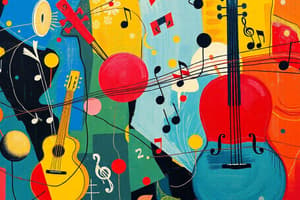Podcast
Questions and Answers
Who is responsible for the administration and implementation of the Award?
Who is responsible for the administration and implementation of the Award?
- National Economic and Development Authority
- National Commission for Culture and the Arts (NCCA) (correct)
- Department of Education
- Department of Health
What year was the Gawad sa Manlilikha ng Bayan first awarded?
What year was the Gawad sa Manlilikha ng Bayan first awarded?
- 1993 (correct)
- 1991
- 1988
- 1995
What is the purpose of the Gawad sa Manlilikha ng Bayan?
What is the purpose of the Gawad sa Manlilikha ng Bayan?
- To recognize modern artists
- To promote foreign artists
- To educate the youth
- To honor traditional artists (correct)
Which organization conducted the 1988 National Folk Artists Award?
Which organization conducted the 1988 National Folk Artists Award?
What role does the Gawad sa Manlilikha ng Bayan Committee play in the process of selecting artists?
What role does the Gawad sa Manlilikha ng Bayan Committee play in the process of selecting artists?
How does the NCCA ensure the transfer of skills from traditional artists to others?
How does the NCCA ensure the transfer of skills from traditional artists to others?
In what field were the first three Gawad sa Manlilikha ng Bayan recipients outstanding?
In what field were the first three Gawad sa Manlilikha ng Bayan recipients outstanding?
What aspect of Filipino life do the folk and traditional artists bring to the attention and appreciation of the people?
What aspect of Filipino life do the folk and traditional artists bring to the attention and appreciation of the people?
What might Filipinos realize someday according to the text?
What might Filipinos realize someday according to the text?
What do the folk and traditional artists provide Filipinos with?
What do the folk and traditional artists provide Filipinos with?
Flashcards are hidden until you start studying
Study Notes
Music and Composition
- Tone-row/Tone-Series: A specific order of 12 notes where no note is repeated, creating an anxious and unresolved musical feeling.
- Concert Music: Blend of jazz with classical and blues elements; notable composers include:
- George Gershwin: Known for "Rhapsody in Blue".
- Aaron Copland: Famous for "Rodeo".
- Dmitry Shostakovich: Recognized for "The Golden Age".
Electronic Music and Innovative Composers
- Electronic Music: Focus on technology's effects on melody and rhythm.
- John Cage: 20th-century American composer known for avant-garde ideas; creator of the "prepared piano".
- Henry Cowell: Inventor of the "rhythmicon"; composed pieces where pianists struck keys with forearms or wrists.
- Edgard Varèse: Experimented with percussion orchestras and tape music using electronic instruments.
Serialism and Notable Composers
- Serialism: Based on Schoenberg's 12-tone system, continued by Anton von Webern. Prominent in the 1950s and 1960s, yet limited in appreciation.
- Charles Ives: First known composer of polytonal music.
- Jean Sibelius: Finnish composer known for symphonic and orchestral works.
- Ralph Vaughan Williams: English composer known for nationalistic themes.
- Milton Babbitt and Pierre Boulez: Significant figures in the use of serialism; employed strict musical formulas.
Philippine Arts
- Philippine Textiles: The Banton cloth, the oldest surviving textile in Southeast Asia, features folkloric motifs and was used as a death wrap.
- Diverse Weaving Traditions: Includes various regional styles such as:
- Pinilian of Ilocanos.
- Kalinga geometric designs.
- Hablon of Kiniray-a.
- T'nalak of T'boli.
Jewelry and Gold in Philippine Culture
- Pre-Colonial Jewelry: Filipinos of all genders wore gold ornaments such as necklaces, earrings, and bracelets, symbolizing social class and identity.
- Gold Sources: Abundant gold found in Butuan, Eastern Visayas, Mindoro, and Surigao.
- Cultural Significance: Gold objects were used in rituals and celebrations, demonstrating social status.
Burial Practices and Archaeological Discoveries
- Gold Death Masks: Covering the deceased's facial features with gold sheets was practiced among certain Filipino groups.
- Maitum Burial Jars: Discovered in Pinol Cave, containing anthropomorphic designs; date back to the Metal Age (circa 190 BC to 500 AD).
- Archaeological Significance: Excavation by the National Museum in 1991 revealed rich cultural practices linked to funerary rites.
Architecture in Early Philippines
- 16th Century Dwellings: Structures primarily made from bamboo and palm leaves.
- Types of Native Houses:
- Bahay-Kubo: Traditional nipa hut, practical for rural living.
- Ifugao House: Known for distinct architectural features suited to mountainous terrain.
- Maranao House: Reflects cultural sophistication and aesthetics in its design.
Studying That Suits You
Use AI to generate personalized quizzes and flashcards to suit your learning preferences.




